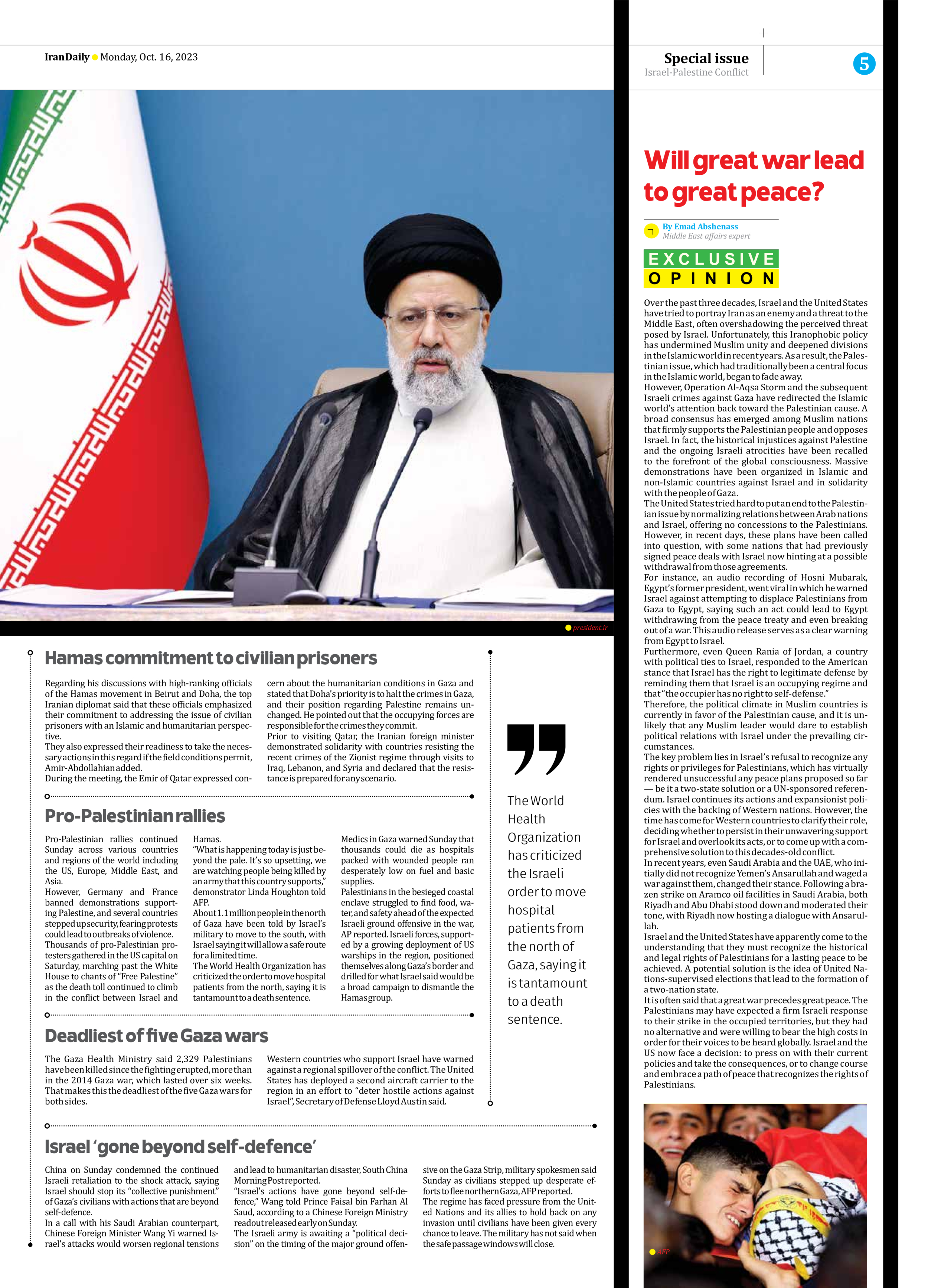
Will great war lead to great peace?
By Emad Abshenass
Middle East affairs expert
Over the past three decades, Israel and the United States have tried to portray Iran as an enemy and a threat to the Middle East, often overshadowing the perceived threat posed by Israel. Unfortunately, this Iranophobic policy has undermined Muslim unity and deepened divisions in the Islamic world in recent years. As a result, the Palestinian issue, which had traditionally been a central focus in the Islamic world, began to fade away.
However, Operation Al-Aqsa Storm and the subsequent Israeli crimes against Gaza have redirected the Islamic world’s attention back toward the Palestinian cause. A broad consensus has emerged among Muslim nations that firmly supports the Palestinian people and opposes Israel. In fact, the historical injustices against Palestine and the ongoing Israeli atrocities have been recalled to the forefront of the global consciousness. Massive demonstrations have been organized in Islamic and non-Islamic countries against Israel and in solidarity with the people of Gaza.
The United States tried hard to put an end to the Palestinian issue by normalizing relations between Arab nations and Israel, offering no concessions to the Palestinians. However, in recent days, these plans have been called into question, with some nations that had previously signed peace deals with Israel now hinting at a possible withdrawal from those agreements.
For instance, an audio recording of Hosni Mubarak, Egypt’s former president, went viral in which he warned Israel against attempting to displace Palestinians from Gaza to Egypt, saying such an act could lead to Egypt withdrawing from the peace treaty and even breaking out of a war. This audio release serves as a clear warning from Egypt to Israel.
Furthermore, even Queen Rania of Jordan, a country with political ties to Israel, responded to the American stance that Israel has the right to legitimate defense by reminding them that Israel is an occupying regime and that “the occupier has no right to self-defense.”
Therefore, the political climate in Muslim countries is currently in favor of the Palestinian cause, and it is unlikely that any Muslim leader would dare to establish political relations with Israel under the prevailing circumstances.
The key problem lies in Israel’s refusal to recognize any rights or privileges for Palestinians, which has virtually rendered unsuccessful any peace plans proposed so far — be it a two-state solution or a UN-sponsored referendum. Israel continues its actions and expansionist policies with the backing of Western nations. However, the time has come for Western countries to clarify their role, deciding whether to persist in their unwavering support for Israel and overlook its acts, or to come up with a comprehensive solution to this decades-old conflict.
In recent years, even Saudi Arabia and the UAE, who initially did not recognize Yemen’s Ansarullah and waged a war against them, changed their stance. Following a brazen strike on Aramco oil facilities in Saudi Arabia, both Riyadh and Abu Dhabi stood down and moderated their tone, with Riyadh now hosting a dialogue with Ansarullah.
Israel and the United States have apparently come to the understanding that they must recognize the historical and legal rights of Palestinians for a lasting peace to be achieved. A potential solution is the idea of United Nations-supervised elections that lead to the formation of a two-nation state.
It is often said that a great war precedes great peace. The Palestinians may have expected a firm Israeli response to their strike in the occupied territories, but they had no alternative and were willing to bear the high costs in order for their voices to be heard globally. Israel and the US now face a decision: to press on with their current policies and take the consequences, or to change course and embrace a path of peace that recognizes the rights of Palestinians.







